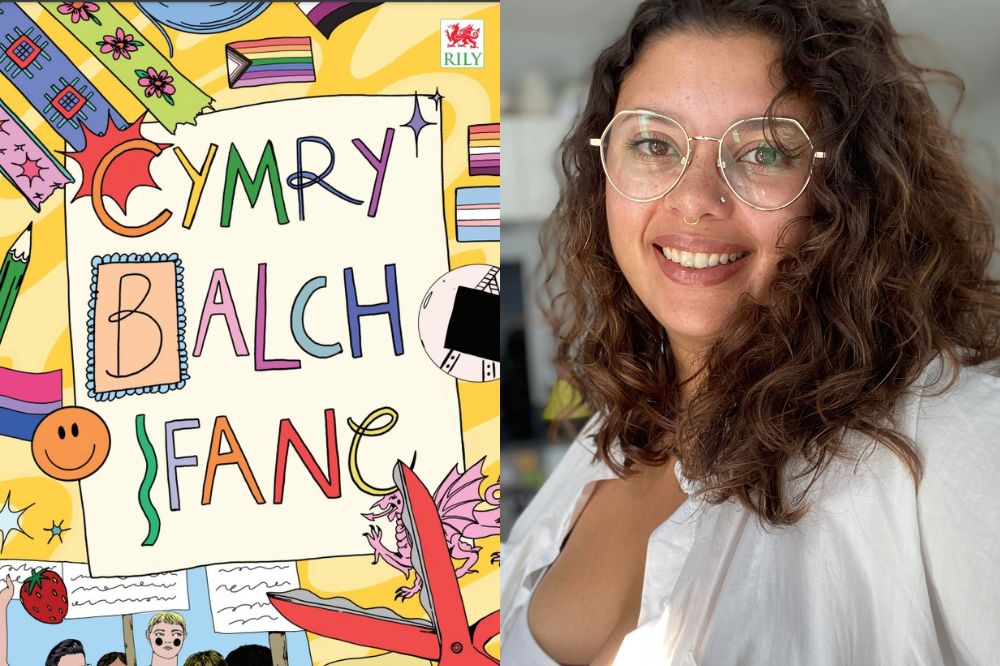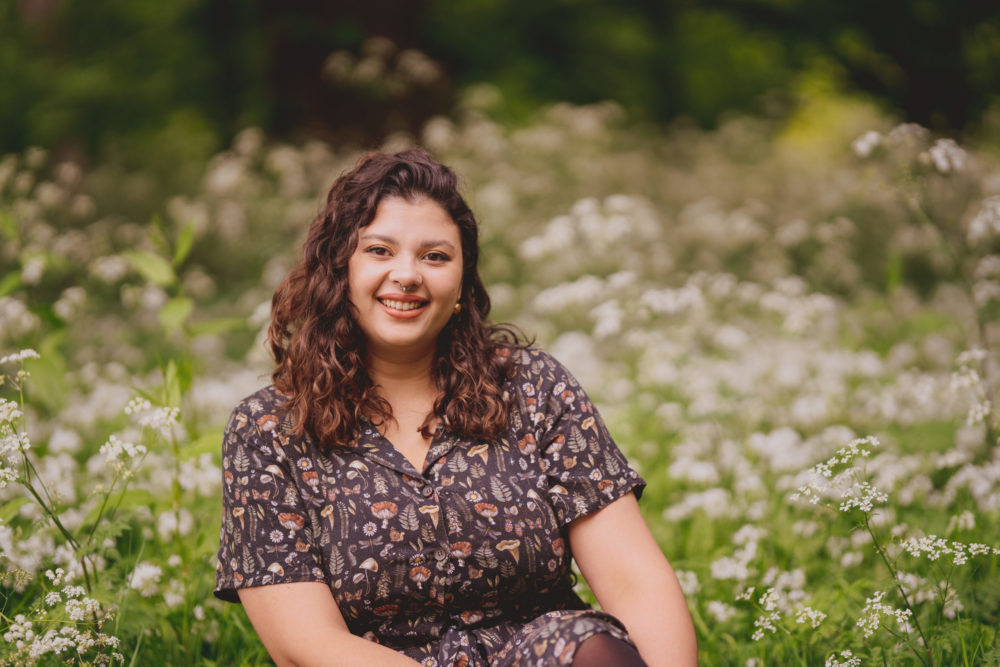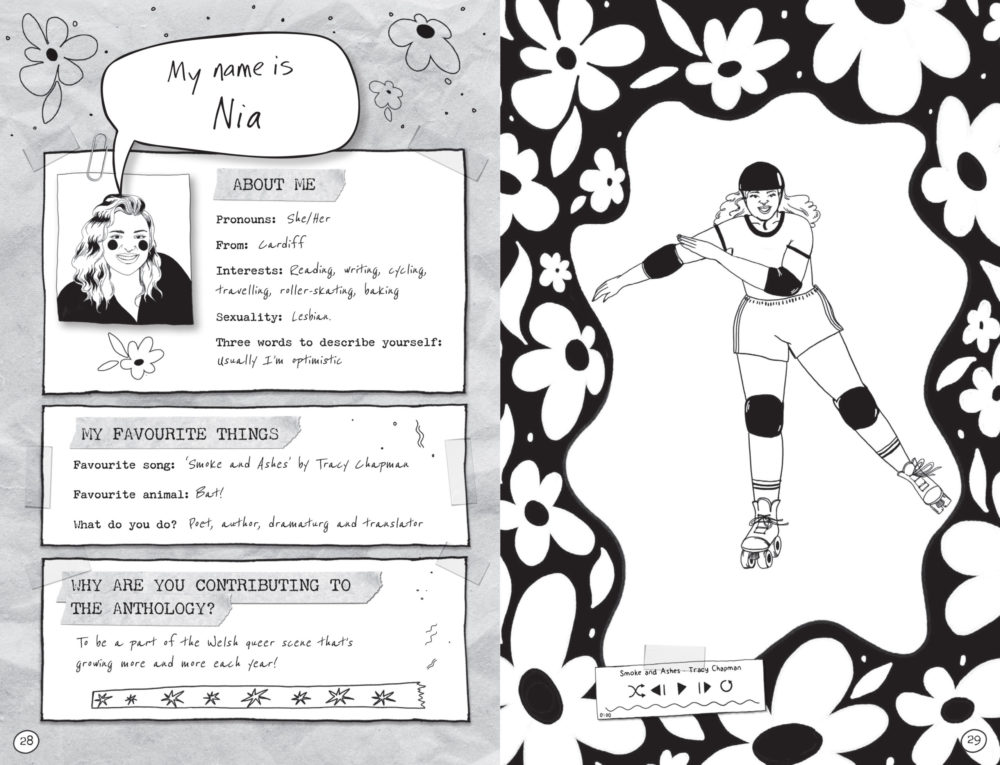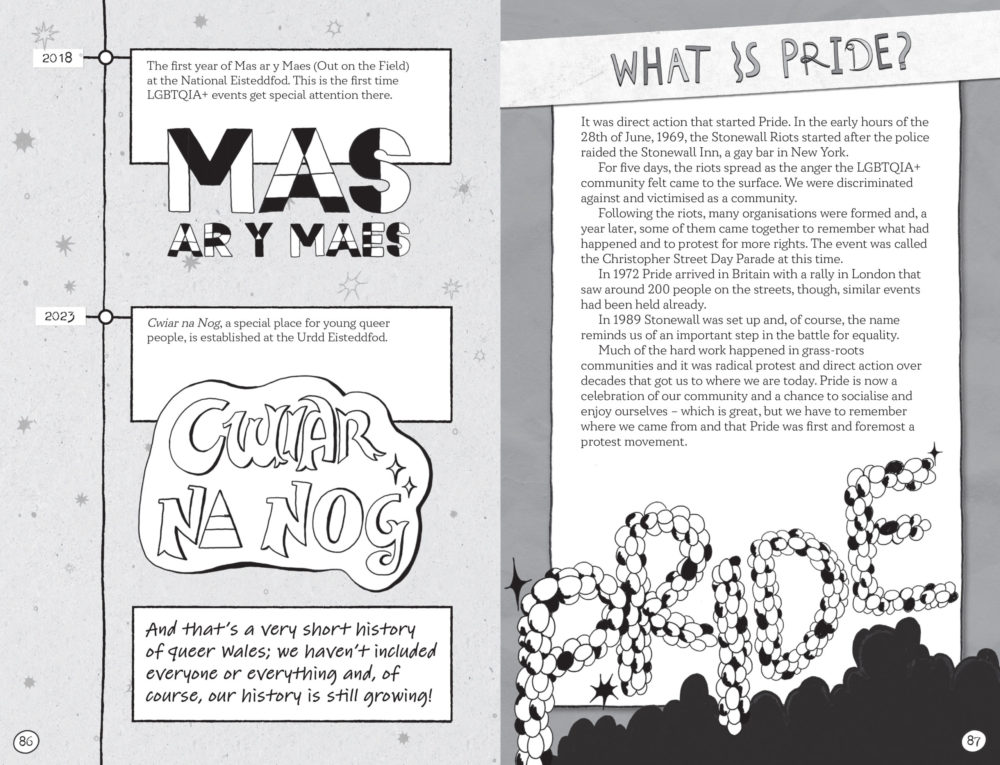Pride and identity: Nia Morais on being queer and Welsh

Llinos Dafydd
“I never thought I could be both Welsh and queer – it felt like I had to choose,” says Nia Morais, a queer, mixed-race Welsh writer and contributor to the newly published Cymry Balch Ifanc / Young Welsh Proud anthology.
The anthology, which is part of the Rhyngom project funded by the Welsh Books Council, features 13 young LGBTQIA+ voices from across Wales, each sharing deeply personal stories about identity, pride, and the challenges of growing up queer in Wales.
Edited by Llŷr Titus and Megan Angharad Hunter, with bold illustrations by Mari Philips, the book offers a raw and honest look at what it means to be Welsh and LGBTQIA+ today.
“I feel quite happy about my identity as a queer Welsh person now, but growing up, I don’t think I ever saw how being Welsh and queer could fit together,” Nia shares.
“I thought I’d have to move away to figure myself out and then come back. I think a lot of queer young people in Wales feel that way.”
Navigating intersectionality
For Nia, being Welsh, queer, and mixed-race is a complex interplay of identities, each bringing its own set of challenges.
“My Welsh and queer identities weave together because the problems I face as a lesbian are similar to the ones I deal with as someone who is half-black, half-white, and a Welsh speaker,” she explains.
“Everything is interconnected, and no one problem stands alone.”

While Nia acknowledges her own struggles, she’s also aware of her privilege in some areas, particularly when comparing her experiences to those of others in the LGBTQIA+ and mixed-race communities.
“I haven’t always felt like I fit in with Welsh speakers, but I know my experience isn’t as difficult as it is for people with darker skin or those who wear a hijab,” Nia says. “It’s important to keep that perspective.”
Her work as a writer often explores these intersections of identity, allowing her to process her own feelings of belonging—or lack thereof—in Welsh culture.
“When I’m writing, the characters are usually like me—queer, mixed-race, Welsh. I think I’m still trying to figure out how these parts of my identity fit together, and writing helps me do that.”
Building community and connection
Connection to her roots and family history plays a central role in Nia’s sense of identity. As the granddaughter of immigrants who came to Cardiff’s docks, she feels deeply connected to both her Welsh heritage and her family’s history of migration.
“Being from Wales is a big part of who I am, but so is the fact that my grandparents came here from another country. That sense of ancestry and family is really important to me.”
In the queer community, Nia has found a similar sense of belonging.
“I’m fortunate to have a community of queer friends now, and it’s such a relief to know I’m not alone,” she says.
“There’s comfort in knowing that, even when things feel tough, there’s a group of people who understand.”

This sense of community is something Nia hopes to foster in her workshops with young people.
“I want to know what makes them feel proud, what makes them feel grounded in their roots. For me, remembering that I’m not the only one dealing with these things makes me feel less alone.”
Writing as therapy
For Nia, writing has always been a way of working through her thoughts and feelings about identity.
“It’s like therapy,” she admits. “When I write, I notice things about myself that I thought I’d moved on from. It helps me process the experiences that still come up, like being queer, mixed-race, or feeling like I’m not ‘Welsh enough.’”
Her hope is that her work can provide that same sense of understanding to young people facing similar challenges.

She shared: “If a young person sees my play or reads my story and thinks, ‘That’s exactly what I’m going through,’ then maybe it’ll help them feel less alone. That’s what I’m trying to do.”
Ultimately, Nia’s message to young LGBTQIA+ people in Wales is one of hope and solidarity.
“There’s a queer community out there, and knowing we’re all in this together makes everything easier,” she says.
“If you need help, don’t hesitate to ask for it. You’re never alone in this.”
Cymry Balch Ifanc / Young Welsh Queer is available now at your local bookstore and online, both in Cymraeg and English.
Support our Nation today
For the price of a cup of coffee a month you can help us create an independent, not-for-profit, national news service for the people of Wales, by the people of Wales.






It would be really useful if a member of the ‘queer community’ could explain to us civilians what being ‘queer’ actually means: I’ve yet to come across a clear explanantion.
If only there were a vast worldwide online reference source where this kind of information was readily available…
I’m sure people will be happy to help, though. Because it’s a genuine interest to know you have, right, rather than just a transparent attempt to invalidate the concept by feigning confusion, yeah?
So we’ve established that you can’t explain it…can anyone?
You’re absolutely right to point out that, as a category, ‘queer’ often appears somewhat nebulous. (And not just to those outside the ‘queer’ community; debates about the term have been raging among queer scholars in academia for decades – literally.) The term can often be rather slippery, as it tends to be used in opposition to the ‘norm’. As someone who identifies as ‘queer’ herself, I would say that ‘queer’ is generally used to apply to individuals who are not heterosexual, or to those who don’t identify with the gender they were assigned with at birth, or to those who… Read more »